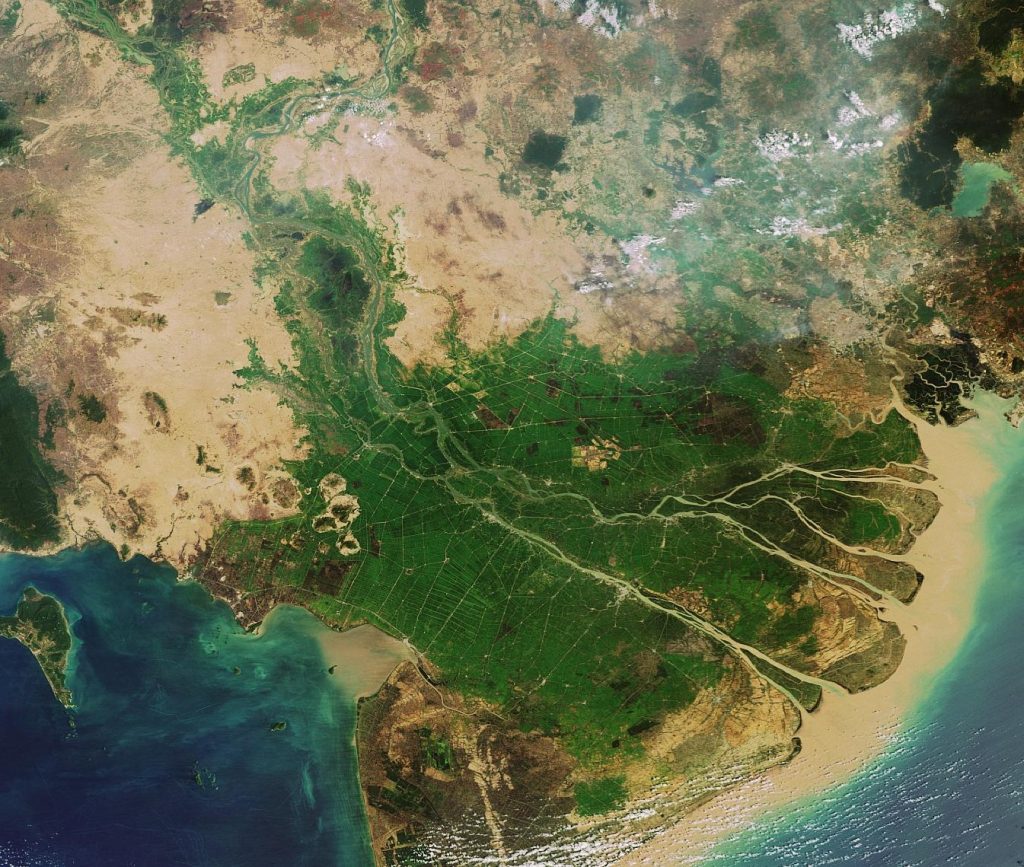In this Lug piece, Siobhan Warrington introduces the Living Deltas Hub and provides an update on how the Newcastle Oral History Unit & Collective is contributing to this large, five-year (2019-2024) international and interdisciplinary project.
Introducing the project
“I used to love standing barefoot in the river…. Now I feel scared to do that”, Dr Tanh Nguyen, a colleague working on the Living Deltas project, reflected, during a recent zoom interview. He wanted to emphasise the current pollution levels of the water ways surrounding his family home in the Mekong Delta of Vietnam compared to the time of his childhood.
Like many large river deltas around the world the Mekong and Red River Deltas of Vietnam are facing multiple threats, including sea-level rise, land salination and increased occurrences of extreme weather events. The Mekong in particular, faces the additional challenges of seasonal drought, as well as significant sediment loss, brought about by multiple hydropower projects upstream and the sand-mining industry.
The Living Deltas Hub seeks to deliver research and related activities that will contribute towards sustainable and equitable futures for those living in the Delta regions of the Mekong and the Red River in Vietnam and the Ganges-Brahmaputra-Meghna (GBM) river system (including the Sundarbans). Coordinated by Newcastle University, it is a partnership of academic institutes from Vietnam, India, Bangladesh and beyond, consisting of over 100 researchers.
Oral history and living deltas
Graham Smith and I are working with colleagues based in the delta regions (and closer to home at Northumbria University) to design and deliver qualitative, visual and participatory research that engages those living in the deltas as both researchers and participants. The work will involve engaging with and listening to women and men from different generations, using oral history, mapping and photography. We hope (and expect) to generate data that is based on first-hand experience and that is subjective and emotional, as well as reflective and analytical; data that includes memories, ideas and opinions, that will provide varied and in-depth accounts of delta lives, past, present and future.

Older people and the environment: a knowledge and policy gap
Our oral history work will contribute to a greater understanding of older people’s relationship to a changing environment. Vietnam has a rapidly ageing population due to significant reductions in the birth-rate and mortality alongside increased life expectancy. Most older people live in rural areas, however an understanding of the relationship between older people and environmental change is missing from the research and policy documents relating to ageing. And in the extensive body of literature concerned with changing socio-ecological systems in the Mekong Delta, there is little recognition of older people; much of the literature fails to take gender or age differences into account when discussing vulnerability and risk, or livelihoods and resilience.
Our oral history work aims to recognise and explore rural women’s and men’s relationship with their changing environment in terms of their knowledge, agency and priorities. We are concerned to take account of differences of experience by age as well as gender and are particularly interested in recording oral histories with those aged over 50 years in order to address the gaps outlined above.
We also recognise the value of taking an intergenerational approach; our methods will involve younger and older generations exchanging knowledge, experience and ideas. We are currently co-designing, with our colleagues in the Mekong, a programme of teaching, learning and doing oral history for a small group of student and community-based researchers. We aim to start the programme by April 2021 with community engagement and oral history recording taking place shortly after.
Contributing to the fields of oral history and the environment and ageing and the environment
We hope this work will contribute to the wider field of oral history and the environment. In addition to Living Deltas NUOHUC is also engaged in Wastes and Strays – an interdisciplinary study of urban commons; and Sue Bradley’s new article, ‘Hobday’s hands’ in the Spring 2021 issue of Oral History, calls for a more inclusive vision that recognises the interconnectedness of human and non-human animal lives. As the Unit’s engagement with this theme builds, we are actively participating in the Oral History Society Special Interest Group on Environment and Climate Change, and value what we learn from the international network of practitioners. They include Leslie McCartney and colleagues in Alaska undertaking various oral history projects to document environmental change, and Nandini Oza in India: oral histories on the Narmada Struggle. We are also looking forward to the upcoming special issue of Oral History Australia – Oral history, place and the environment later in 2021.
As we enter the UN’s decade of Healthy Ageing (2021-2030), we also hope that our work will contribute to an increased awareness of the rights and capacities of older women and men in programmes and policies that relate to responding to and adapting to environmental degradation and climate change.
